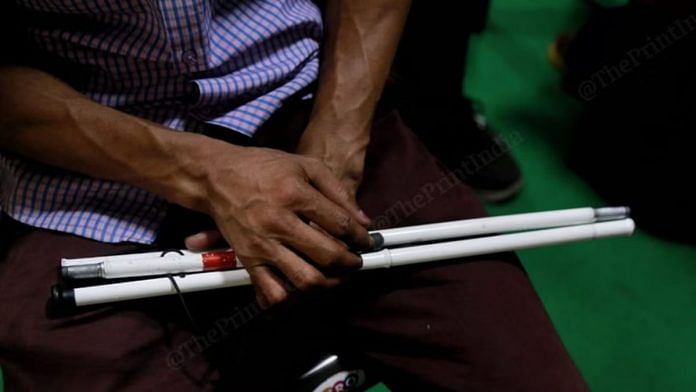The government’s decision to drop disability-related questions from the National Family Health Survey-6 is disappointing.
The NFHS-5 (2019-2021), which introduced these questions, was criticised for grossly underestimating India’s disabled population at 1 per cent. That shouldn’t have resulted in the removal of disability questions altogether from the sixth round of survey, which starts in July. It should have started explorations on why India is consistently underestimating disability. After all, the NFHS can and should play a critical role in highlighting health issues, nutritional status and healthcare challenges faced by any Person with a Disability (PwD) in India.
Social stigma, subjective disability
As per the World Health Organisation, 16 per cent of the world’s population is disabled. The 2011 Census of India estimated the population of disabled persons in the country to be 2.21 per cent. The Census had a simple question: whether anyone in the household was a Person with a Disability. If the answer was yes, one had to choose from eight types of disabilities identified in the form. In 2019, the NFHS-5 included a similar question. But unfortunately, it went one step back by only recognising five types of disabilities.
The Census came at a time when the Persons with Disabilities Act 1995 was still in force. The Act itself recognised only seven disabilities. However, by the time disability was included in the NFHS, India had the Rights of Persons with Disabilities Act 2016, which recognised 21 disabilities.
Asking a single pointed question on disability does indeed lead to multiple challenges. Due to social stigmas associated with disability, family members of persons with disabilities might be hesitant to share or even internally accept the honest answer. Similarly, officials conducting these surveys may also carry these stigmas, making them hesitant to ask such questions. It wasn’t a surprise that an NFHS official told The Times of India that “Disability is decided on medical certification. Our surveyors are not doctors and they cannot be checking medical certificates. People could not even answer the questions properly”. Sadly, he didn’t complete the statement: even surveyors cannot ask the questions properly.
Second, the definition of disability is subjective. A disability to me might not be a disability to you. This is why many countries have started asking targeted questions on individual functioning to collect data on disability, popularly called the Washington Group of Questions. Some examples include “Do you have difficulty walking or climbing steps?” or “Do you have difficulty remembering or concentrating?”. Respondents are expected to answer on a scale ranging from 1 (no difficulty) to 4 (cannot do at all).
Persons with disabilities have challenges in terms of the related comorbidities. For example, according to international health experts, 50 per cent of people with Down Syndrome have congenital heart disease. People with spinal cord injuries have weak chest muscles impacting their lungs. The Covid-19 pandemic had an adverse impact on persons with disabilities as social distancing was impossible for most.
Also read: Twitter is the voice of Persons with Disabilities. Dear Elon Musk, don’t fail us now
Disability in policy
Earlier this year, Finance Minister Nirmala Sitharaman announced in her budget that India will get rid of sickle cell anaemia by 2047. It was a bold, ambitious goal welcomed by India’s disabled community. But the NFHS doesn’t seem in sync with policymakers as it has dropped questions on anaemia that were introduced in NFHS-5.
The current government has done a lot to bring the issue of disability to the forefront. Whether it’s legislations like the Rights of Persons with Disabilities Act 2016 (its implementation remains a challenge), campaigns like the Accessible India Campaign (which received mixed results) to Prime Minister Narendra Modi regularly bringing up the topic in his Mann Ki Baat radio show.
Accurate data leads to a stronger focus on disability in policy and politics. For example, this year’s budget slashed the expenditure cap on the Scheme for Implementation of the (Rights of) Persons with Disabilities Act by Rs 90 crore.
I hope the government is listening, and disability-related questions are reintroduced in NFHS-6. The new Census, whenever it happens, should also look at disability through a social lens, using the Washington Group of questions.
It was heartening to see a strong focus on accessibility in the newly inaugurated Parliament. It was also interesting to see an increase in seating capacities in both lower and upper Houses – clearly a precursor to the delimitation due in 2026, which could see an increase in parliamentary seats. An accurate estimate of India’s disabled population would help strengthen the case for them in Parliament and local elected bodies such as Panchayats. Why shouldn’t a community that comprises almost 16 per cent of India’s population have seats reserved in Parliament? It is time the community moves from “Nothing About Us, Without Us” to “Nothing Without Us”.
Nipun Malhotra is a Disability Rights activist and Founder, Nipman Foundation. He can be followed on twitter @nipunmalhotra. Views are personal.
(Edited by Ratan Priya)



